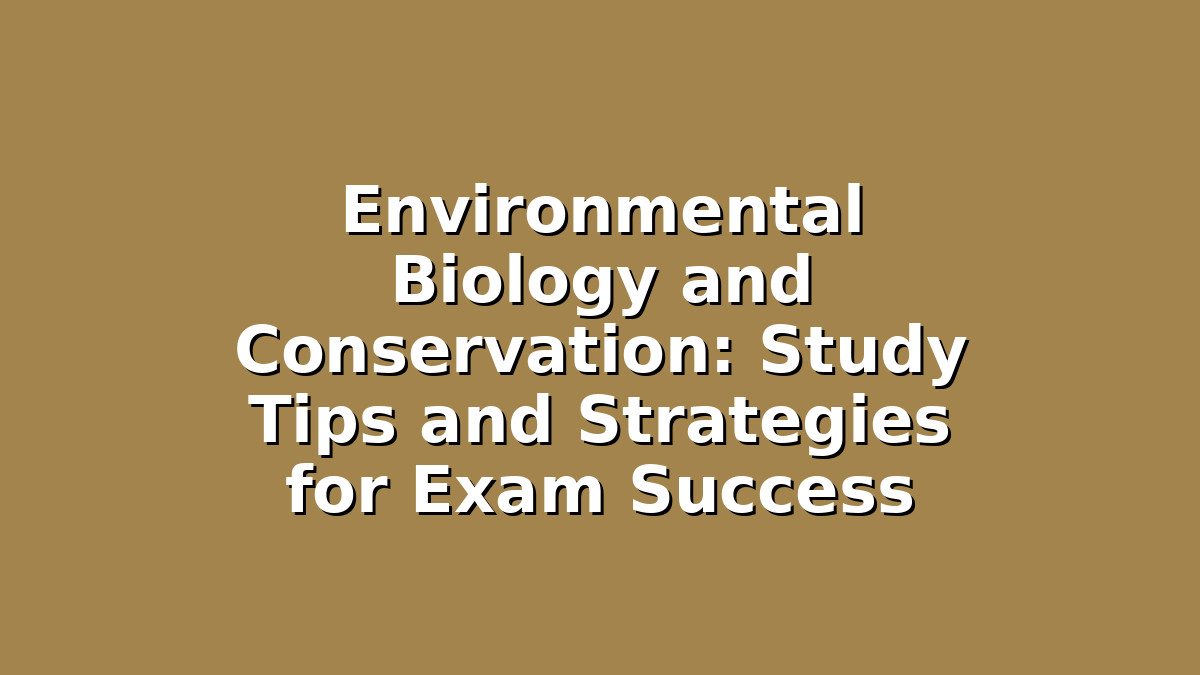Environmental biology and conservation are fascinating subjects that explore the relationships between living organisms and their environments, as well as the efforts to protect and preserve natural ecosystems. For students preparing for exams, mastering these topics not only helps achieve academic success but also deepens your understanding of the natural world and the challenges it faces. Whether you’re tackling complex concepts like biodiversity, ecological interactions, or conservation strategies, having a clear study plan and effective techniques can make all the difference.
In this article, we’ll guide you through essential study tips tailored for environmental biology and conservation. From organizing your materials and understanding core principles, to applying real-world examples and practicing exam questions, you’ll gain practical advice to boost your confidence and performance.
1. Understand and Organize Core Concepts
Environmental biology and conservation cover a wide range of topics, including ecosystems, species interactions, human impacts, and conservation methods. To excel in your exams, start by building a strong foundation of key concepts.
Break Down the Syllabus: Begin by reviewing your syllabus or course outline. Identify the main themes such as ecosystem structure, energy flow, nutrient cycles, species diversity, habitat loss, pollution, and conservation techniques like protected areas, restoration ecology, and sustainable resource management. Knowing what you need to cover helps you avoid feeling overwhelmed.
Create Concept Maps: Visual learners will find concept maps invaluable. Draw diagrams that link related ideas—for example, connect food chains to trophic levels and energy transfer, or link causes of biodiversity loss to conservation responses. This visual approach helps in retaining complex information and seeing the big picture.
Use Flashcards for Terminology: Environmental biology has many scientific terms and definitions. Flashcards can help you memorize key vocabulary like “keystone species,” “ecological niche,” or “biotic and abiotic factors.” Apps like Anki or Quizlet offer useful tools for digital flashcards, making it easy to review anytime.
Summarize with Your Own Notes: Instead of passively reading textbooks, rewrite information in your own words. Summaries encourage deeper processing and help you grasp intricate processes like nutrient recycling or the greenhouse effect. Bullet points and numbered lists make notes easier to scan during revisions.
2. Connect Theory to Real-World Examples
One of the best ways to understand environmental biology and conservation is by relating theory to current events and case studies. This approach not only makes learning more interesting but also prepares you for exam questions that ask for examples or explanations based on real life.
Stay Updated with Environmental News: Follow credible outlets like National Geographic, scientific journals, or environmental organizations (e.g., WWF, IUCN). Topics such as climate change, deforestation, endangered species, and conservation projects provide concrete contexts for abstract ideas.
Use Local and Global Case Studies: If your syllabus allows, include examples from your country or region alongside global issues. For instance, studying the effects of deforestation in the Amazon can be complemented by examining local conservation efforts or protected reserves. This dual approach enriches your answers and demonstrates broader understanding.
Create a Case Study Bank: Keep a dedicated section in your study notes for case studies. Include key facts, impacts, solutions, and lessons learned. For example, note the causes and consequences of coral bleaching in the Great Barrier Reef, or the success story of reintroducing wolves to Yellowstone National Park. Having these ready makes it easier to integrate examples into essays or short answers.
Discuss and Debate: Engage with classmates or online forums to discuss environmental issues. Explaining concepts to others or debating conservation strategies sharpens your critical thinking and reinforces your knowledge. If you’re studying alone, try teaching the material to an imaginary audience or recording yourself summarizing topics.
3. Practice Exam Techniques and Time Management
Knowing the content is crucial, but effective exam performance also depends on how well you manage your time and approach questions strategically.
Review Past Papers: Obtain previous exam papers or sample questions from your teacher or online resources. Practicing with these helps you familiarize yourself with question formats, common topics, and the level of detail expected in answers.
Simulate Exam Conditions: Set a timer and complete practice papers in one sitting without distractions. This builds your stamina and helps you manage time during the actual exam. Note which questions take longer and find ways to answer more efficiently.
Plan Your Answers: For essay or long-answer questions, spend a few minutes outlining your main points before writing. A clear structure with an introduction, body paragraphs, and conclusion improves coherence and ensures you cover all necessary aspects.
Use the ‘Highlight and Annotate’ Method: When reading questions, underline key terms and jot brief notes in the margin. This technique keeps you focused and ensures you address each part of the question fully.
Take Care of Yourself: Don’t underestimate the power of rest and nutrition. Regular breaks during study sessions, a healthy diet, and adequate sleep improve concentration and memory retention. Avoid last-minute cramming, which can increase stress and reduce recall.
—
Conclusion
Studying environmental biology and conservation is both rewarding and challenging. By organizing core concepts, connecting your learning to real-world examples, and honing your exam techniques, you’ll build a solid understanding and present your knowledge confidently during exams. Remember, persistence and smart study strategies are key—every bit of effort brings you closer to success.
Stay curious, stay motivated, and know that what you learn contributes to a greater awareness of our planet’s future. Good luck with your studies!

Responses